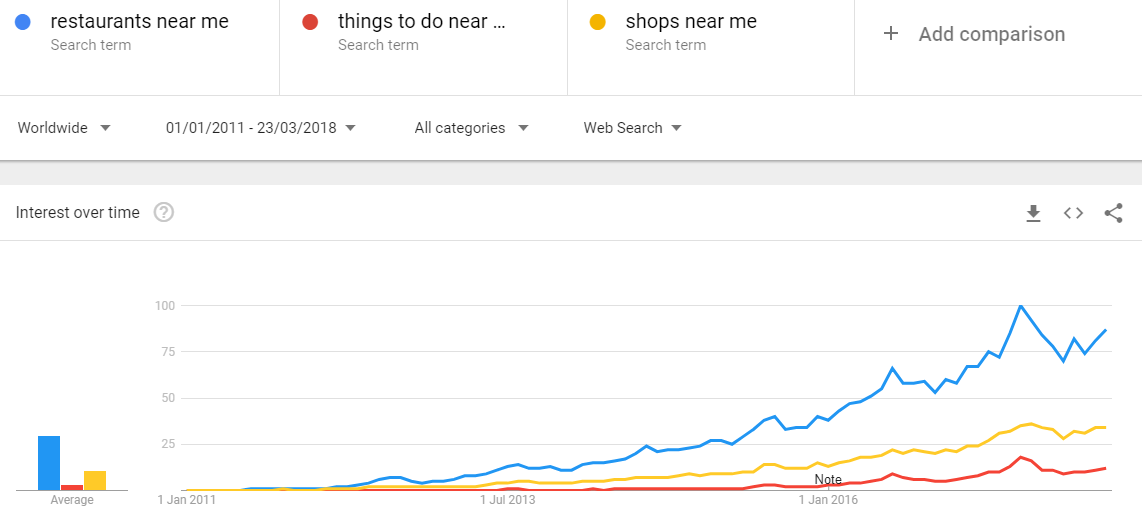
Pubs, clubs, cafes and the lot: if you’ve paid attention to the terms that users on the search engine are searching to find your venue or service, you may have noticed that phrases including ‘near me‘ just might have been popping up quite frequently. These are searches that usually follow the theme of examples such as “cafes near me” or “restaurants near me” and are currently revolutionising convenience and promptness on the search engine.
The rise in ‘near me‘ search queries isn’t anything new, but the push towards the usage of these search engine result trigger words on the search engine has never been stronger. Having gradually seen an organic and steadily increase over the years, ‘near me’ searches are set for a future in which its growth will continue. These type of searches aren’t anything we can expect to be seen to be put to bed anytime soon, with analysis from Google stating that this quirky way of searching has grown by more than 130% year on year, with mobile capitalising the most through such convenience – with 88% of all ‘near me’ searches coming from mobile. Through Google Trends, we can see that this term has been an ever-increasing development over the years, having first appeared on the scene in around 2010/11. Despite only one major drop in interest for ‘near me’ searches in the summer months of 2017, followed by a steady increase then into the winter, a prediction could be made that this phrase is one that searchers aren’t going to get rid of anytime soon. Some could say that in particular, the ease of access to information through technology may just be playing a massive role.

Transforming Technology
The increase in smart device usage that has the ability to extract and present information to you promptly at the sound of your voice, such as smart home assistants Amazon Echo and Google Home and other personal assistants such as Siri and Cortana have revolutionised the way in which we are delivered information and changed the way in which we request information. Gone are the days in which we’d have to state our specific location in a search query, but now rather we can simply request our smart devices to locate a service or venue ‘near me’ and our devices will pick up on our current location, automatically understanding just exactly where we’re looking for such occasion from.
The interconnectivity of the search engines and our day-to-day lives have also seen a more sophisticated location tracking implementation added, resulting in more defined locational results. Search engines such as Google have for a while used our internet address to discover the basis of the area of which you reside in, but more precise location tracking having sprung up in recent years (including tracking user location data even when you have it turned off) have made ‘near me’ a worthy contender of other location-included text searches. When it comes to utilising the ‘near me’ function in your search queries, the results you’ll receive on a desktop is as good as the results you’d receive on mobile: whatever the device, you’ll see a deliverance of the much-sought results that you had hoped for.
‘Near me’ searches are more than just an added convenience, but likely to be the future of searching. When type-to-text searches are gone and all of our searches are through voice or other means, using location attributes in our search will see itself made redundant.
Significant SEO Changes
All of this is of most importance, as it’ll end up changing the way in which SEO gurus and digital marketing experts will (or should) carry out their SEO. Firstly, location keywords of locations you wish to rank for should be included in page title text and prominently on the page as part of any regular page optimisation for local SEO services. Until search engines find a way to define the location of a site (or the location that it is targeting), it’ll still be of best effectiveness to try and rank for the location terms of the services that you offer. Secondly, if the world goes the way of smart devices and convenience-based search results, service-based terms will become even more competitive as algorithms could end up only providing one or two results back. Picture asking your voice-based assistant for a ‘hairdresser near you’: the future isn’t going to see it respond with a list of 10 different hairdressers, but instead the hairdresser it believes will be best for you.
Paid Search
Elsewhere away from organic search, in the realm of paid search on platforms such as Adwords, we can see that there is a similar thing happening – with ‘near me’ searches outgunning, if not exceeding, all other terms on a campaign where ‘near me’ can be applicable. From my own personal experience running Adwords campaigns for various service-type companies across the spectrum, I started seeing ‘near me’ searches appearing as broad match keyword searches for campaign ads that I had run, proving that such term was being used by the every-day searcher. I had decided to then add ‘near me’ keywords across our campaigns, “massage near me”, “chiropractor near me” to list a few. From the get-go, these ‘near me’ keywords ended up being one of the most valuable conversion-wise, whilst too bringing in more ad clicks than any other keyword on various ad groups.

In Conclusion
The significance in those two words are likely to signify the phase of local search that we currently reside in: one that doesn’t necessarily require a searching user to state their location but will (for the time being) still require the digital marketer to optimise their website for such location. As a phrase that defines convenience and ease of action, the only phrase that would be more convenient would be to search for a service without any additional location keywords or without adding a ‘near me’. This, however, can provide a quality of results that may sorely differentiate, with search engines not knowing whether you’re looking for information or looking for a service and until that is figured out, which will likely take some time, the next best thing will be the ‘near me’ way of searching.

